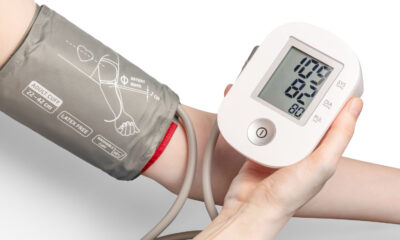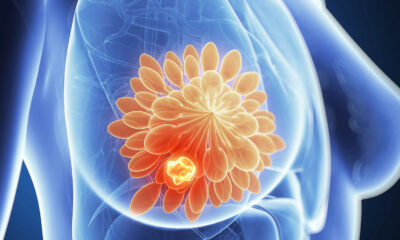Health
Lifestyle changes that can lower your blood pressure

Hypertension is a medical condition that is associated with ageing, and which affects both men and women, once they reach 50 years or about that age. It has been established that a person could develop hypertension at a younger age. Nonetheless, when discovered early and properly managed medically, a person with hypertension can still live a fully functional prolonged life, without developing other health complications or even delaying their onset. Below are tips for lowering blood pressure.
Make small changes
If you have high blood pressure, there’s plenty you can do every day to control it. Eating healthier, exercising more, and tweaking other day-to-day habits can help keep your readings in check. That might keep you from needing medication to keep your numbers where they should be.
Eat a healthy diet
You can lower your blood pressure by eating lots of whole grains, fruits, vegetables, and low-fat dairy. Look for foods that don’t have much fat or cholesterol. This approach has a name: the Dietary Approaches to Stop Hypertension (DASH) diet. It includes lean meats, poultry, fish, and nuts. It’s also high in protein and fibre and avoids sugary drinks, red meats, and sweets.
Lose extra weight
Shedding even a few extra kilograms can lower your blood pressure. It’s also important to watch your waist. Too much bulk around your midsection can affect your BP. For women, a waist of more than 35 inches is high. For men, it’s more than 40 inches.
READ ALSO:
- Nollywood actor, Desmond Elliot wins Surulere constituency with over 10,000 votes
- Osun PDP agent pays voters via PoS (VIDEO)
- APC in Rivers contested against INEC not PDP – Amaechi
Be Active
Exercise can help you lower your blood pressure and lose weight. Aim to get at least 150 minutes of physical activity each week. Look for aerobic workouts that make your lungs and heart work a little harder. Try things like brisk walking, biking, swimming, or dancing. Even chores like raking leaves or washing windows count.
Watch your salt
Too much sodium can raise your blood pressure. You should aim for no more than 1,500 milligrams a day. You don’t get sodium just from the salt you sprinkle in foods. It can also hide in packaged foods. Read labels before you buy. Salt can lurk in things like soups, sandwiches, and pizza.
Get more potassium
Your blood pressure is likely to be higher if you don’t get enough of this nutrient. Shoot for between 3,000 and 3,500 milligrams each day. How much is that? A medium banana has about 420 milligrams. A baked potato with the skin gives you more than 900 milligrams. Spinach, beans, tomatoes, oranges, yoghurt, and sweet potatoes are also high in potassium. Some people with medical issues like kidney disease or who take certain medicines may have to be careful with potassium. So check with your doctor before changing what you eat.
Ease stress
Health
Lassa Fever Deaths in Nigeria Rise to 51 After 15 Killed in Early February – NCDC

Lassa Fever Deaths in Nigeria Rise to 51 After 15 Killed in Early February – NCDC
Nigeria is facing a rising Lassa fever outbreak in 2026, with 15 deaths recorded in the first week of February, pushing the total fatalities from confirmed cases to 51 between the first and sixth epidemiological weeks, the Nigeria Centre for Disease Control and Prevention (NCDC) has reported. This reflects the continued severity of the viral haemorrhagic disease. The 15 deaths reported between February 2 and 8 translate to a Case Fatality Rate (CFR) of 21.3 per cent, higher than the 19.4 per cent recorded during the same period in 2025, despite a decline in overall suspected cases compared to last year.
Two healthcare workers were also infected in week six of the outbreak, highlighting the ongoing risks faced by frontline responders. Cumulative data for 2026 show 1,034 suspected cases, 240 confirmed cases, and four probable cases, spread across 10 states and 42 Local Government Areas (LGAs). For comparison, during the same period in 2025, Nigeria recorded 1,913 suspected cases, 413 confirmed infections, and 80 deaths across 11 states and 63 LGAs, showing a reduction in suspected cases but persistence of high fatality rates.
READ ALSO:
- Mob Kills Injured Motorcycle Rider After AK‑47 Rifles, Ammunition Found in Crash Scene
- Tacha Condemns False Rape Allegations After Mirabel Admits Fabrication
- UK Court Hands Life Sentence to Nigerian Teen for Knife Attack Killing
In the latest reporting week alone, 15 deaths occurred from 74 confirmed infections out of 271 suspected cases, resulting in a weekly CFR of 20.3 per cent. Confirmed cases increased from 44 in epidemiological week 5 to 74 in week 6, indicating a week-on-week rise in infections. The new confirmed cases were reported across eight states — Taraba, Ondo, Bauchi, Edo, Benue, Nasarawa, Kogi, and Ebonyi — affecting 24 LGAs.
Data analysis shows that 89 per cent of confirmed infections in 2026 are concentrated in four high-burden states: Bauchi (38%), Taraba (22%), Ondo (20%), and Edo (9%), while the remaining 11 per cent of cases were reported from six other states. The outbreak predominantly affects people aged 21 to 30 years, although cases range from 1 to 74 years, with a median age of 29 years. The male-to-female ratio among confirmed cases stands at approximately 1:0.7.
To manage the outbreak, the NCDC has activated the National Lassa Fever Multi-Partner, Multi-Sectoral Incident Management System (IMS) to coordinate surveillance, case management, laboratory support, and risk communication across affected states. The agency has urged citizens to adopt preventive measures such as improving sanitation and hygiene, practicing rodent control, ensuring early presentation of suspected cases at health facilities, and cooperating with public health authorities. The NCDC emphasised that timely intervention, early treatment with Ribavirin, and community awareness are critical to reducing fatalities and containing the outbreak.
Lassa Fever Deaths in Nigeria Rise to 51 After 15 Killed in Early February – NCDC
Health
Ramadan Health Tips: Six Ways to Stay Hydrated While Fasting

Ramadan Health Tips: Six Ways to Stay Hydrated While Fasting
Staying hydrated during Ramadan is essential for maintaining energy, focus, and overall well-being while observing long hours of fasting. Health experts warn that poor hydration can lead to fatigue, headaches, dizziness, and reduced concentration. Below are six essential, numbered tips to help you stay properly hydrated throughout the holy month:
1. Drink Enough Water Between Iftar and Suhoor
Ensure you consume 6–8 glasses of water between Iftar and Suhoor. Spread your intake gradually instead of drinking large amounts at once, allowing your body to absorb fluids effectively.
2. Break Your Fast With Water
Start Iftar with water to quickly replace fluids lost during the day and prepare your digestive system for food. Avoid sugary or carbonated drinks at this stage, as they can increase thirst later.
READ ALSO:
- Tinubu Urges Senate to Confirm Yusuf for NAHCON, Marafa for INEC
- Galatasaray Stun Juventus 5–2 in UEFA Champions League
- Vinicius Jr’s Wonder Goal Gives Real Madrid Victory Over Benfica
3. Eat Water-Rich Foods
Include fruits and vegetables with high water content, such as watermelon, oranges, cucumbers, tomatoes, lettuce, and soups. These foods support hydration while providing essential nutrients.
4. Reduce Salty, Spicy, and Fried Foods
Limit foods high in salt, oil, and spices, especially at Suhoor, as they increase thirst and can cause dehydration during fasting hours.
5. Limit Caffeine Intake
Reduce consumption of coffee, tea, and energy drinks, as caffeine has a diuretic effect that causes the body to lose more fluids. If taken, balance it with extra water.
6. Never Skip Suhoor
Suhoor plays a crucial role in hydration and energy. Eat a balanced pre-dawn meal that includes water, fruits, vegetables, whole grains, and protein to help sustain you throughout the day.
Maintaining proper hydration during Ramadan fasting helps support digestion, boosts energy levels, and keeps the body functioning optimally throughout the holy month.
Ramadan Health Tips: Six Ways to Stay Hydrated While Fasting
Health
NUFBTE Workers Occupy NAFDAC Lagos Office Over Sachet Alcohol Ban

NUFBTE Workers Occupy NAFDAC Lagos Office Over Sachet Alcohol Ban
Members of the National Union of Food, Beverage and Tobacco Employees (NUFBTE) on Thursday staged a protest at the NAFDAC office in Isolo, Lagos, demanding the reversal of the agency’s ban on sachet and PET-bottled alcoholic beverages. The union claims the ban contradicts a directive reportedly issued by the Federal Government, and they want production lines that were sealed to be immediately reopened.
The protesters, including manufacturers, distributors, and industry workers, argued that the enforcement of the ban threatens jobs, livelihoods, and the operations of small and medium-sized enterprises that rely on sachet alcohol sales. During the demonstration, union members handed a petition to NAFDAC officials, urging dialogue and a more balanced approach that safeguards both public health and the food and beverage sector.
NUFBTE cited alleged instructions from the Office of the Secretary to the Government of the Federation and the Office of the National Security Adviser, claiming that NAFDAC should suspend enforcement. The union said continued closure of production lines and restriction of alcohol sales would lead to economic hardship and widespread job losses.
READ ALSO:
- Naira Could Trade Below ₦1,000/$ With Dangote Refinery at Full Capacity — Otedola
- Adeyanju Urges EFCC, DSS to Probe El-Rufai Over Alleged Corruption, Insecurity in Kaduna
- Granite-Laden Truck Kills Motorist, Leaves Wife Critically Injured in Lekki–Ajah Crash
However, NAFDAC rejected the claims, with Director-General Prof. Mojisola Adeyeye stating that no federal directive has instructed the agency to halt the ban. In a statement, the regulator described circulating reports as “false” and “misleading,” emphasizing that its actions are within statutory authority and in line with official government policies.
“NAFDAC has not received any formal directive to suspend its regulatory or enforcement activities concerning sachet alcohol,” the statement read. The agency reiterated its commitment to public health protection, regulatory compliance, and consumer safety, warning the public and industry stakeholders to rely on verified information from official channels.
The ban, implemented earlier this month, targets alcoholic beverages packaged in sachets and containers smaller than 200ml, a measure aimed at reducing unregulated alcohol consumption and protecting vulnerable groups. While the policy has faced backlash from workers and businesses, NAFDAC maintains that it is necessary for national health and safety.
The protest underscores the tension between regulatory enforcement and economic concerns, as workers continue to call for inclusive policymaking and engagement with industry stakeholders to mitigate the impact on jobs and local businesses.
NUFBTE Workers Occupy NAFDAC Lagos Office Over Sachet Alcohol Ban
-

 International2 days ago
International2 days agoCanada Opens New Express Entry Draw for Nigerian Workers, Others
-

 Politics12 hours ago
Politics12 hours agoPeter Obi Launches ‘Village Boys Movement’ to Rival Tinubu’s City Boys Ahead of 2027
-

 News2 days ago
News2 days agoKorope Drivers Shut Down Lekki–Epe Expressway Over Lagos Ban (Video)
-

 Health3 days ago
Health3 days agoRamadan Health Tips: Six Ways to Stay Hydrated While Fasting
-

 News19 hours ago
News19 hours agoPolice to Arrest TikToker Mirabel After She Recants False Rape Claim
-

 Entertainment3 days ago
Entertainment3 days agoActress Destiny Etiko Breaks Silence on Alleged Nollywood Betrayal
-

 metro2 days ago
metro2 days agoOsun Awards 55.6km Iwo–Osogbo–Ibadan Road Project to Three Contractors
-

 International21 hours ago
International21 hours agoEpstein, Ex-Israeli PM Named in Alleged Profiteering From Boko Haram Crisis







